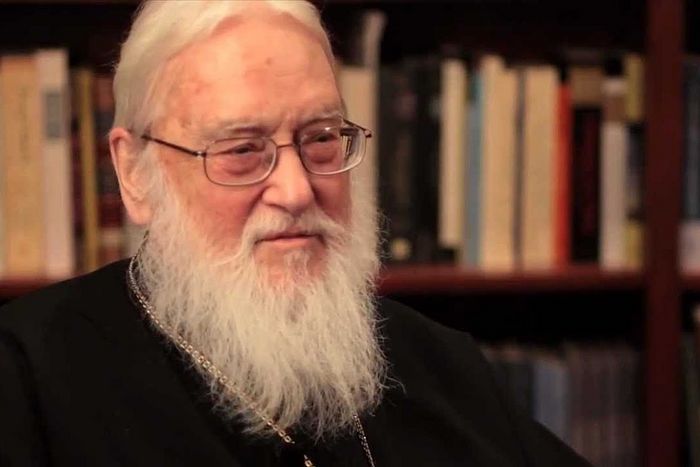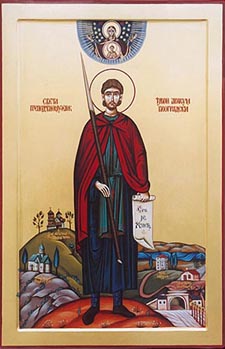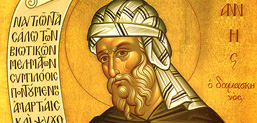21. February 2019 - 15:09
 The Assembly of Canonical Orthodox Bishops of the United States of America affirms the sanctity of life based on the firm conviction that life begins at the moment of conception.
The Assembly of Canonical Orthodox Bishops of the United States of America affirms the sanctity of life based on the firm conviction that life begins at the moment of conception.
The Assembly remains steadfast in its conviction that any interference in the development of life is a serious issue, and therefore it regularly participates in a variety of relevant events and also releases pertinent statements on the topic. While recognizing that there are rare but serious medical instances where mother and child may require extraordinary actions, the Assembly of Bishops is deeply concerned that the taking of innocent life through abortion has become an acceptable cultural norm. This phenomenon – increasingly prevalent throughout contemporary societies – was exacerbated by a recent law of the New York State Senate (Bill S.240). The Assembly of Canonical Orthodox Bishops of the United States of America categorically denounces these adverse developments that allow for abortion, under certain unjustifiable circumstances, even within the third trimester of existence.
26. January 2019 - 21:31
 Brothers and friends and fathers and children called by God, lend your God-loving hearts to hearing the divine dogmas. And hearing these holy words place them, brothers, in your hearts and the conscience of your souls and before the eyes of your mind and understand them.
Brothers and friends and fathers and children called by God, lend your God-loving hearts to hearing the divine dogmas. And hearing these holy words place them, brothers, in your hearts and the conscience of your souls and before the eyes of your mind and understand them.
God, all merciful and lover of mankind, having immeasurable mercy for man, bowed the Heavens and descended to earth, and with His Divine Dispensation and voluntary bearing of many different sufferings to His Divine Body, enlightened the human race; and He sent to the whole world the Holy Apostles, saying: „Go and teach all nations, baptizing them in the name of the Father and the Son and the Holy Spirit“.
19. January 2019 - 23:59
In the name of the Father, and of the Son, and of the Holy Spirit.
Dear brethren and sisters, today we are gathered here to glorify in prayer the great feast of Theophany.
This Sunday, in the liturgical language of the Church, is called the Sunday after the Enlightenment.
Some of us probably know that in antiquity, and even today in the liturgical books, the feast of the Theophany of the Lord is referred to as the Day of the Enlightenment.
Why is such a title, such an appellation, applied to the feast of the Baptism, the feast of Theophany?
If we carefully investigate and delve with you into the hymns of these recent days, we would have to direct our attention to the fact that these hymns speak to us of the appearance of our Lord Jesus Christ at the Jordan for baptism.
16. January 2019 - 14:49
 From the Keynote Address by Metropolitan Kallistos (Ware of Diokleia) at the IOTA Inaugural Conference, 9-12 January 2019 in Iasi, Romania
From the Keynote Address by Metropolitan Kallistos (Ware of Diokleia) at the IOTA Inaugural Conference, 9-12 January 2019 in Iasi, Romania
Synodality
Turning now to synodality, we can see at once the way in which a Church council is to be regarded as a Eucharistic event. Most councils have been concerned with the restoration of Eucharistic communion when this has been broken, with the question who may or may not be admitted to receive the sacrament; and most (if not all) councils have concluded with a concelebrated Liturgy, embracing all the members.
29. December 2018 - 23:34
 After the collapse of Karageorge’s revolt in 1813, the Turks began a reign of terror against the Serbs. Disease also swept the area because of the many bodies left unburied. The people attempted another revolt under Hadj-Prodan Gligorijevic, and the monks of Trnava became involved in it. The rebellion took place on the Feast of the Cross (September 14), but it was crushed by the Turks. Many people were captured, and some were executed on the spot as a warning to others.
After the collapse of Karageorge’s revolt in 1813, the Turks began a reign of terror against the Serbs. Disease also swept the area because of the many bodies left unburied. The people attempted another revolt under Hadj-Prodan Gligorijevic, and the monks of Trnava became involved in it. The rebellion took place on the Feast of the Cross (September 14), but it was crushed by the Turks. Many people were captured, and some were executed on the spot as a warning to others.
Some of the prisoners were sent to Suleiman Pasha in Belgrade, among whom were Sts Paisius and Avakum. The holy deacon Avakum sang “God is with us” (from Compline) in the prison cell, while St Paisius prayed. The Turks offered to free anyone who would convert to Islam. Some of the prisoners agreed to this, but the majority refused to deny Christ, and so they were put to death.
17. December 2018 - 11:18

 John was first the chief minister to Caliph Abdul-Malik and later a monk in the Monastery of St. Sava the Sanctified.
John was first the chief minister to Caliph Abdul-Malik and later a monk in the Monastery of St. Sava the Sanctified.
Because of his ardent defense of the veneration of icons during the reign of the iconoclastic Emperor Leo the Isaurian, John was maligned by the emperor to the Caliph, who cut off his right hand. John fell down in prayer before the icon of the Most-holy Theotokos, and his hand was rejoined and miraculously healed.

 The Assembly of Canonical Orthodox Bishops of the United States of America affirms the sanctity of
The Assembly of Canonical Orthodox Bishops of the United States of America affirms the sanctity of  Brothers and friends and fathers and children called by God, lend your God-loving hearts to hearing the divine dogmas. And hearing these holy words place them, brothers, in your hearts and the conscience of your souls and before the eyes of your mind and understand them.
Brothers and friends and fathers and children called by God, lend your God-loving hearts to hearing the divine dogmas. And hearing these holy words place them, brothers, in your hearts and the conscience of your souls and before the eyes of your mind and understand them.
 From the Keynote Address by Metropolitan Kallistos (Ware of Diokleia) at the IOTA Inaugural Conference, 9-12 January 2019 in Iasi, Romania
From the Keynote Address by Metropolitan Kallistos (Ware of Diokleia) at the IOTA Inaugural Conference, 9-12 January 2019 in Iasi, Romania After the collapse of Karageorge’s revolt in 1813, the Turks began a reign of terror against the Serbs. Disease also swept the area because of the many bodies left unburied. The people attempted another revolt under Hadj-Prodan Gligorijevic, and the monks of Trnava became involved in it. The rebellion took place on the Feast of the Cross (September 14), but it was crushed by the Turks. Many people were captured, and some were executed on the spot as a warning to others.
After the collapse of Karageorge’s revolt in 1813, the Turks began a reign of terror against the Serbs. Disease also swept the area because of the many bodies left unburied. The people attempted another revolt under Hadj-Prodan Gligorijevic, and the monks of Trnava became involved in it. The rebellion took place on the Feast of the Cross (September 14), but it was crushed by the Turks. Many people were captured, and some were executed on the spot as a warning to others.
 John was first the chief minister to Caliph Abdul-Malik and later a monk in the Monastery of St. Sava the Sanctified.
John was first the chief minister to Caliph Abdul-Malik and later a monk in the Monastery of St. Sava the Sanctified. 